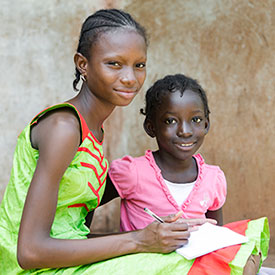 Photo credit: borgogniels/istock/Thinkstock
Photo credit: borgogniels/istock/Thinkstock
The Adolescent HIV Prevention and Treatment Implementation Science Alliance (AHISA) aims to support the use of implementation science approaches. AHISA aims to enhance the effective use of evidence and help overcome implementation challenges related to prevention, screening and treatment of HIV among adolescents in sub-Saharan Africa by catalyzing collaboration and communication among NIH-funded implementation scientists, program implementers and policymakers.
About AHISA
The goals of the Alliance are to:
- Provide a platform for cross-fertilization and exchange of ideas and information among implementation scientists and other stakeholders focusing on different aspects of HIV in adolescents;
- Enable the research to be better informed by programmatic challenges and questions;
- Inform policymakers of promising evidence and encourage use of the data in decision making; and
- Extend the reach and impact of implementation science related to adolescent HIV prevention and treatment.
AHISA is made up of 26 teams across 11 countries in sub-Saharan Africa. Each team is composed of NIH-funded scientists conducting relevant implementation research; in-country partners including in-country staff, key in-country government representatives, in-country research collaborators, and other stakeholders; and youth. The Alliance is led by members of CGHS and driven by a steering committee of experts.
Read about the leadership and membership of AHISA
Alliance Sustainability Projects
These projects aim to catalyze long-term and sustainable region- and country-specific collaborations that respond to local implementation issues and increase implementation science capacity across sub-Saharan Africa.
Read about our Alliance Sustainability Projects
Activities
The Alliance convenes an annual forum that enables the exchange of ideas, insights and experiences, as well as webinars, panel sessions, and other events.
Read more about our annual forum and other events
Resources
The network and its members have developed a number of deliverables including publications, toolkits, and other resources that further adolescent HIV and implementation science efforts.
Read peer-reviewed articles and other publications about AHISA
Publications
-
Building locally anchored implementation science capacity: the case of the adolescent HIV implementation science alliance-supported local iS alliances, co-authored by Fogarty's Susan Vorkoper and Rachel Sturke
Frontiers in Health Services, October 13, 2024 -
Implementation Science for Eliminating HIV Among Adolescents in High-Burden African Countries: Findings and Lessons Learned from the Adolescent HIV Prevention and Treatment Implementation Science Alliance (AHISA), authored by Fogarty’s Susan Vorkoper, Fogarty Acting Deputy Director Rachel Sturke, and grantees Nadia A. Sam-Agudu, Linda-Gail Bekker
AIDS and Behavior, March 25, 2023
-
Implementation Science for the Prevention and Treatment of HIV among Adolescents and Young Adults in Sub-Saharan Africa: A Scoping Review co-authored by Fogarty staff
AIDS and Behavior, August 10, 2022 -
Implementation determinants and mechanisms for the prevention and treatment of adolescent HIV in sub-Saharan Africa co-authored by Fogarty staff
Implementation Science Communications, May 22, 2021 -
Fostering successful and sustainable collaborations to advance implementation science: the adolescent HIV prevention and treatment implementation science alliance co-authored by Fogarty staff
Special Issue of the Journal of the International AIDS Society (JIAS), Aug 31, 2020 -
Making implementation science work for children and adolescents living with HIV co-authored by Fogarty staff
JAIDS Supplement, Jul 17, 2018
Related News
Updated February 28, 2025